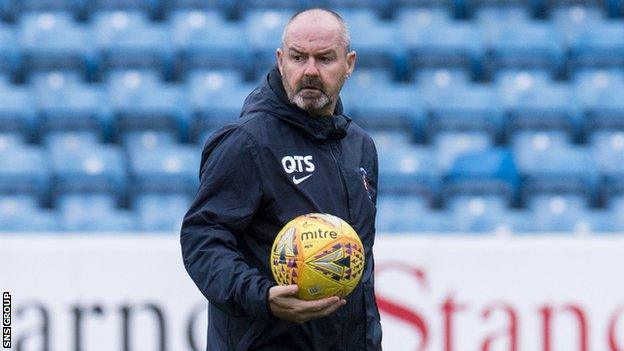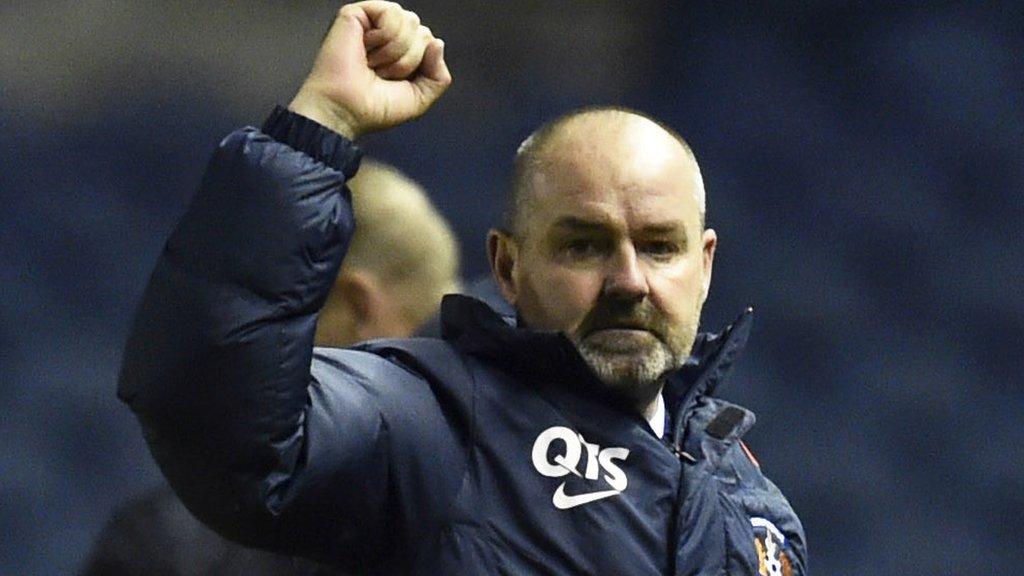Chris McLaughlin's words of the weekend: Do Scots accentuate the positive?
- Published

Kilmarnock got their first win under Clarke on Sunday, beating Hearts 2-1 at Murrayfield
BBC Scotland's senior football reporter, Chris McLaughlin, analyses a talking point from the weekend's action, asking what's behind the words.
Kilmarnock manager Steve Clarke |
|---|
"Scottish people are very good at running down their own game and I think we should be a little bit more positive about it and try to push the game" |
Having spent the best part of two decades coaching across the border, the Kilmarnock manager is probably well equipped to answer questions about what other countries think of our game.
In fact, there's hardly a corner of England the Ayrshire man hasn't taken a training session. From Newcastle to London, to Liverpool and a few places in between, the 54-year-old has seen it all.
And after a stunning start to his managerial career back home, it's seems only right we should listen to what he has to say. But just how well equipped is he to gauge what Scotland thinks of its own game?
What evidence is there to suggest we are good at running down our game? Has this notion simply become the slightly clunky cliche that follows the predictable clunky search for external affirmation?
Following Celtic's latest record breaking achievement at becoming the first British club to go 63 domestic games unbeaten, a well respected English sportswriter tweeted his praise for Brendan Rodgers' side's achievements.
The 'lack of opposition' caveat was inserted but only in a futile bid to cut off the non-believers as they reached for the reply button. They replied anyway.
But nothing riles Scottish football fans more than English fans having a pop at our product. And so the banter battle commenced in a digital field with 140 character skirmishes taking place across the day.
Leaving aside the obvious arguments about cash, cash and cash, the passionate defence of our game from our fans is evidence that, rather than running it down, they stand ready to talk it up.
But what about the media? It's another well worn argument. The accusation being that us journalists would rather have a go at our game than shine a light on its successes.

Clarke has lifted the Rugby Park side off the foot of the Premiership table
What is undeniably true is that bad news sells. From boardroom battles and administrations to national team failures and what ifs, figures would suggest we love to consume controversy.
Reporting on such events, however, is very different to creating them or highlighting them unnecessarily. In all my years as a journalist I've not once encountered a colleague who doesn't get the thrill of cup final day, who doesn't share the passion of our national game with those who sit outside the press box and who would pass up the chance to highlight the positives when newsworthy?
Show me an analyst who works here who is negative about Scottish football. It would make no sense and it's simply not the case.
So that leaves the clubs and governing bodies. It's clearly not in their interests to run down their own game but it is incumbent on them to push it and be positive. Are clubs buying into what many see as our great selling point - our passion?
Are they doing enough to make the match day experience memorable? Where is the innovation and the strategy to compete, if not financially then at least intelligently with new ideas?
Fans continue to flock through the turnstiles in Scotland in numbers that defy the laws of marketing. That should never be taken for granted.
In the push to talk up our game it may well be that mentioning the unseen faces of those who apparently talk it down is helping do just that. It's far from perfect but it's ours and more people love it than some give credit for.
Maybe if we stop seeking external affirmation we can use internal passions to help us realise it is not half as bad as somebody somewhere thinks it is.
- Published5 November 2017
